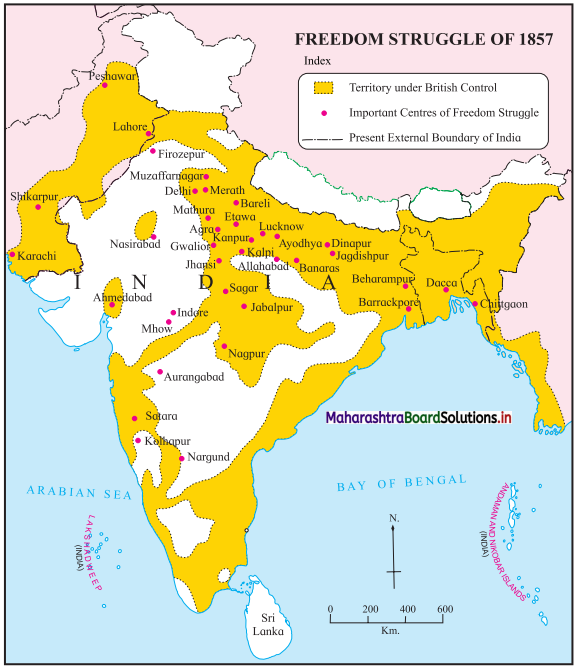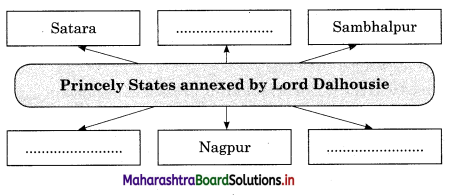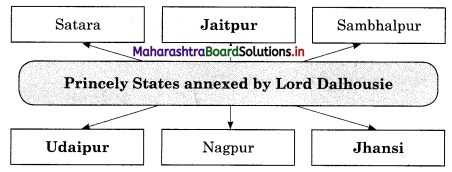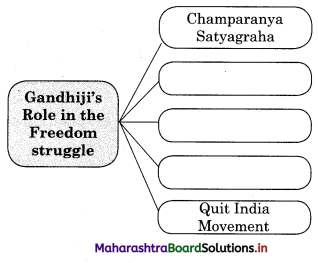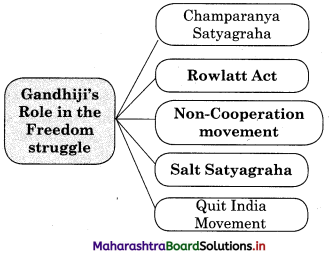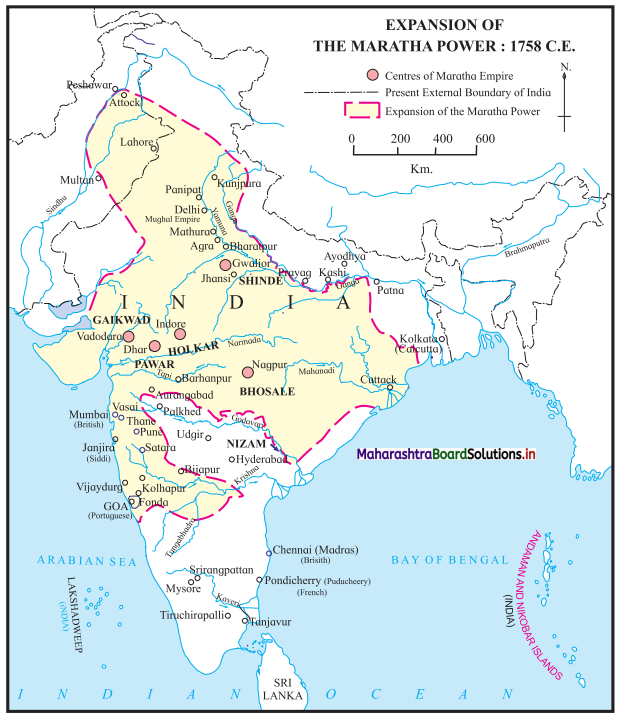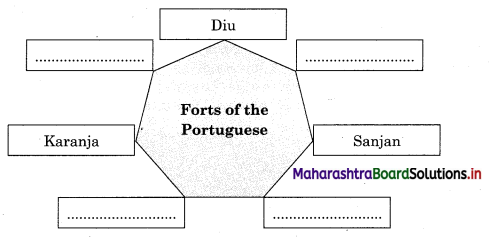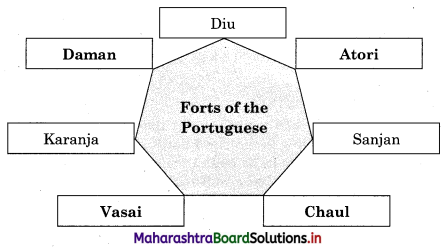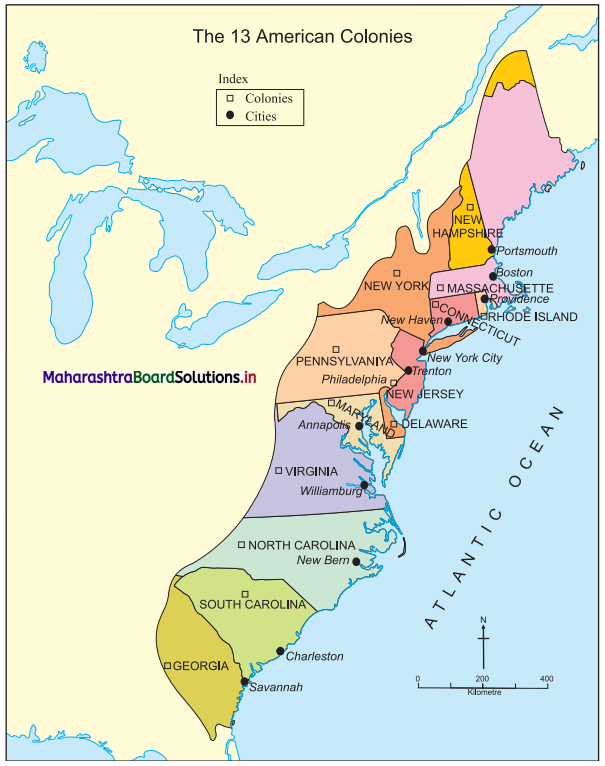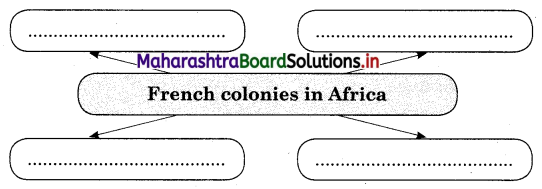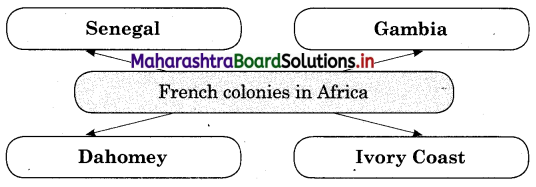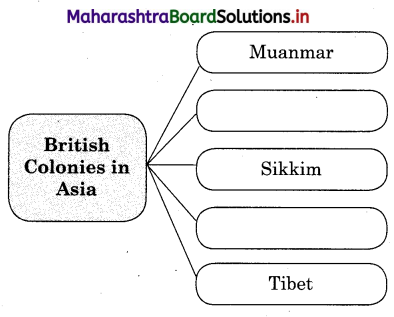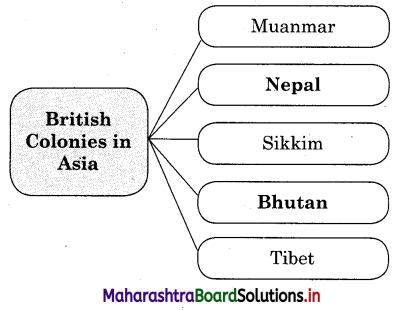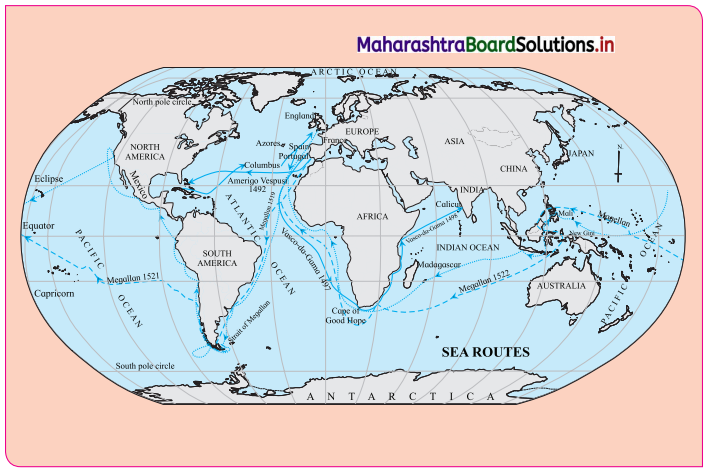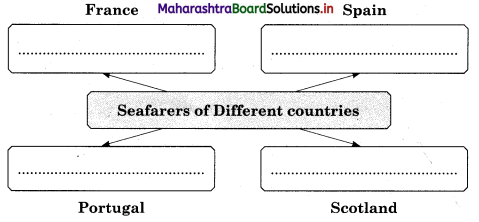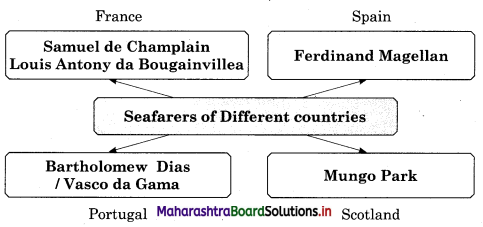Balbharti Maharashtra State Board Class 12 Political Science Important Questions Chapter 2 Key Concepts and Issues Since 1991: Globalisation Important Questions and Answers.
Maharashtra State Board 12th Political Science Important Questions Chapter 2 Key Concepts and Issues Since 1991: Globalisation
Complete the following statements by selecting the appropriate option.
Question 1.
Some of the important changes that occurred in the economic sphere in the age of globalization are
(a) Free flow of finance capital
(b) Creation of GATT
(c) Rise of Transnational Companies
(d) Focus on intellectual property rights
Answer:
(c) Rise of Transnational Companies
Question 2.
The term ‘socialist market economy’ is used to describe the system in
(a) India
(b) China
(c) France
(d) United States
Answer:
(b) China
![]()
Question 3.
Activities like farming, fishing, etc., are included in the ……….. sector.
(a) primary
(b) secondary
(c) service
(d) tertiary
Answer:
(d) tertiary
Question 4.
The Indus Waters Treaty is signed between India and
(a) Bangladesh
(b) Nepal
(c) China
(d) Pakistan
Answer:
(d) Pakistan
Question 5.
At Kundankulam there is opposition to building of the
(a) airport
(b) special economic Zone
(c) nuclear power plant
(d) oil refinery
Answer:
(c) nuclear power plant
Complete the following sentences by selecting the appropriate reason.
Question 1.
Investment in the infrastructure sector is more important than that in the consumer sector because ………………….
(a) there is greater extent of profit in it.
(b) real development will take place only when infrastructure is prevalent.
(c) foreign investments are mostly in the consumer sector.
Answer:
(b) real development will take place only when infrastructure is prevalent.
![]()
Question 2.
Prior to the 1990s, foreign investments in India were rare because ………………
(a) government regulations made investments difficult.
(b) cold war was in progress.
(c) India was self reliant and did not need any investments.
Answer:
(a) government regulations made investments difficult..
Question 3.
TRIPs by WTO is a significant treaty because ………………
(a) it has replaced the GATT.
(b) it has extended the multilateral trading systems to services.
(c) it sets down minimum standards for most forms of intellectual property regulation.
Answer:
(c) it sets down minimum standards for most forms of intellectual property regulation.
Question 4.
During the Cold War, India had a mixed economy as ………………….
(a) it was nonaligned.
(b) both public sector and private sector played an important role.
(c) it had adopted the economic pattern of Soviet Union.
Answer:
(b) both public sector and private sector played an important role.
State the appropriate concept for the given statements.
Question 1.
Changes that occurred in the post cold war era due to advanced interconnectedness and technology.
Answer:
Globalisation
Question 2.
A category of property that refers to intangible creations of human intellect such as patents.
Answer:
Intellectual property
![]()
Find the odd word.
Question 1.
Wipro, Dabur, Burger King, ONGC.
Answer:
Burger King (not an Indian MNC)
Question 2.
Manufacturing, Farming, Mining, Fishing
Answer:
Manufacturing (not from primary sector)
Question 3.
Copyrights, Insurance, Trademarks, Patents.
Answer:
Insurance (not intellectual property)
Question 4.
Green Peace, Amnesty International, Red Cross, Taliban.
Answer:
Taliban (terrorist outfit)
Expand the following abbreviations.
Question 1.
WTO
NGO
GATT
TRIPs
Answer:
WTO – World Trade Organisation
NGO – Non-Governmental Organisation
GATT – General Agreement on Tariffs and Trade
TRIPs – Trade Related Aspects of Intellectual Property Rights
![]()
State whether the following statements are true or false with reason.
Question 1.
Position of the State is being challenged externally as well as internally.
Answer:
This statement is True.
- Some analysts argue that in the age of globalisation, the State has become less important. It’s sovereignty is being challenged from both, outside and within.
- External challenges come from rise of regional organisations, international laws, growing humanitarian concerns, etc. Internal challenges come from growth of ethnic nationalism, relevance of non State actors and a decline of national consensus.
Question 2.
Countries should have the right to interpret human rights according to their situation.
Answer:
This statement is True.
- In the age of globalisation, protection and promotion of human rights is very significant. The western approach to human rights focuses on civil and political rights while developing countries maintain that economic development must precede full enjoyment of individual rights.
- Countries have to interpret human rights in accordance to their history, culture, economic and political needs.
Question 3.
In a globalised world, the State has become irrelevant.
Answer:
This statement is False.
- Many analysts explain that the role of the State is slowly reducing in the economic as well as political sphere. Some of the State’s powers may have reduced due to international treaty obligations but the State’s authority remains the same.
- The State still remains the key actor in the domestic as well as international sphere. The State remains relevant inspite of the emergence of global civil society and increasing levels of cross border trade and investment.
![]()
Question 4.
All countries in the world follow almost the same type of economic system today.
Answer:
This statement is False.
- Today, in a globalised world, there appears to be only one dominant ideological and economic , system i.e. ‘Market Economy.’ However, the nature of the market economy is determined by the ideology of that country.
- The USA has a ‘capitalist market’ economy which combines capitalist system with market economics. In most West European nations, the political system is a ‘welfare State’, so they adhere to welfare market economies. China has a socialist market economy and Indian system is described as economic liberalism.
Explain the correlation between the following.
Question 1.
Transnational Corporations – Globalisation
Answer:
Transnational Corporations are a type of Multi National Companies e.g., General Electric, Walmart, Nike etc. It is a borderless entity as it does not consider any particular country as it’s homebase. Globalisation has led to many private sector companies expanding their area of operations in foreign lands. Due to globalisation traditional companies can now spread out their operations in many countries to sustain high levels of responsiveness to the local markets. Transnational Corporations (TNCs) try to make decisions from a global perspective rather than from one centralised base. Actions taken by TNC’s can help in better relationships between nations as well as in the spread of resources.
Express your opinion of the following.
Question 1.
Multi National Companies are both beneficial as well as disadvantageous to developing nations.
Answer:
Multi National Companies (MNC’s) refer to organizations that own or control production of goods or services in at least two or more countries other than it’s home country e.g., Amazon, Coca-Cola Company, eBay, Honda, etc.
The advantages of MNC’s are they improve local infrastructure, provide local employment, diversify local economies, encourage innovation and better standards of production. They provide an inflow of capital and help to utilise the developing nation’s resources.
Disadvantages of MNC’s in developing countries are that natural resources may be overexploited, environment may be damaged, local laws may be ignored, MNC’s import skilled labour and so may not really lead to better employment but may put local outfits out -of business.
![]()
Question 2.
The Arab spring in Egypt is sometimes called the ‘Facebook revolution’ in Egypt.
Answer:
The Arab Spring refers to a series of anti-government protests and uprisings that spread across much of the Arab world in the early 2010s. It began in Tunisia and spread to Libya, Egypt, Yemen, Syria and to a smaller extent to Iraq, Lebanon, Sudan, Morocco, etc. It’s main goals were regime change, economic progress and human rights. In Egypt, it began on 25th January 2011 when millions of protestors all over Egypt protested against President Hosni Mubarak’s regime. This was in response to a ‘Day of Revolution’ organized on Facebook on 25th January. It lasted till 11th February 2020.
Answer the following question in 80 to 100 words.
Question 1.
Discuss the political issues in the context of globalisation.
Answer:
Globalisation refers to the rapid spread of goods and services, technology and information, ideas and culture, trade and interactions across the world. It is the connection of different parts of the world resulting in the expansion of international cultural, informational, economic and political activities. In the early 1990s, the term globalisation was used to include economic, political, socio¬cultural, technological and ideological changes that occurred in the world in the post cold war era. The world has become more interconnected due to advances in technology and communication. Events in one part of the world have an impact on other parts of the world. Changes have taken place economically and culturally.
The political issues in the context of globalisation are-
1. Importance of Democracy – Disintegration of the Soviet Union and the revolutions in East European countries was an expression of end of communism and a move towards democratic systems. Today, concepts like ‘Participatory State’, ‘Good governance’, etc., have become important. A participatory State indicates that all sections of society participate in policy making and in the democratic process. Good governance focuses on the role of civil society in the functioning of an accountable, responsible and responsive government.
2. Position of the State – Under globalisation, sovereignty of the State which is closely linked to it’s jurisdiction appears to be challenged internally and externally. Internal challenges include activism of nonstate actors, rise of divisive factors, decline of national consensus, etc while external challenges include rise of regional economic organisations, growing humanitarian concerns, etc.
3. Nonstate actors – Today, not only States but also non-state actors like NGO’s play a significant role in international affairs and in promoting humanitarian issues.
4. Human Rights – Protection and promotion of human rights is an important issue in the age of globalisation. Countries interpret human rights in accordance with their history, culture, economy and polity, Many nations including India lay stress on social justice before full enjoyment of civil and political rights.
It is often argued that the role and importance of the State is slowly reducing, However, the State is still pivot in domestic and international spheres.
![]()
Question 2.
Discuss the economic issues in the context of globalisation.
Answer:
Globalisation refers to the rapid spread of goods and services, technology and information, ideas and culture, trade and interactions across the world. It is the connection of different parts of the world resulting in the expansion of international cultural, informational, economic and political activities. In the early 1990s, the term globalisation was used to include economic, political, socio-cultural, technological and ideological changes that occurred in the world in the post cold war era. The world has become more interconnected due to advances in technology and communication. Events in one part of the world have an impact on other parts of the world. Changes have taken place economically and culturally.
The economic issues in the context of globalisation are-
1. Free flow of finance and capital – Investments provide finance and help to build industries. Indian companies both private for e.g., Tatas and government e.g., ONGC have invested in many countries in Asia, Africa and Europe. Foreign companies have also invested in India in sectors like power plants, infrastructure projects, consumer food chains, etc. This free flow of capital is both ways i.e., India to foreign countries and vice-versa. Foreign investment especially in the infrastructure sector is essential.
2. Change in the concept of trade
- WTO – It was established in 1995 to replace GATT. The WTO is the only agency that oversees the rules of international trade, settles trade disputes and organises trade negotiations and agreements.
- The scope of the term ‘trade’ has widened to include not only traditional commodities like fruits, grains, minerals, oil, etc., but also services like banking, insurance and intellectual property like trademarks.
- Use of container cargo ships to carry huge amount of goods all over the world.
3. Rise of Transnational companies for e.g., Nestle, Unilever, etc., operate in India. Even Indian multinational companies like Wipro, Bajaj, etc are doing well. This affects the economy as follows-
- Labour market – MNC’s recruit skilled and semi-skilled employees for eg Indian labour is employed in West Asia, Europe, USA, etc in industrial and service sectors.
- Small shops and industries – Those stores which are efficient, continue to thrive while some industries either sell out to MNC’s or shut down.
- Agricultural sector- Many MNC’s have introduced new technology and opened up direct markets for Indian agricultural products for eg India exports spices, fish, etc. to many nations.
![]()
Answer the following question with reference to the given point in 150 to 200 words.
Question 1.
Discuss the following issues in the context of globalisation.
(a) Economic issues
(b) Ideological issues
(c) Socio-cultural issues
(d) Technological issues
Answer:
Globalisation refers to the rapid spread of goods and services, technology and information, ideas and culture, trade and interactions across the world. It is the connection of different parts of the world resulting in the expansion of international cultural, informational, economic and political activities. In the early 1990s, the term globalisation was used to include economic, political, socio¬cultural, technological and ideological changes that occurred in the world in the post cold war era. The world has become more interconnected due to advances in technology and communication. Events in one part of the world have an impact on other parts of the world. Changes have taken place economically and culturally.
(a) Economic Issues
Some economic changes that have occurred due to globalisation.
1. Free flow of finance and capital – Investments provide finance and help to build industries. Indian companies both private for e.g., Tatas and government e.g., ONGC have invested in many countries in Asia, Africa and Europe. Foreign companies have also invested in India in sectors like power plants, infrastructure projects, consumer food chains, etc. This free flow of capital is both ways i.e., India to foreign countries and vice- versa. Foreign investment especially in the infrastructure sector is essential.
2. Change in the concept of trade
- WTO – It was established in 1995 to replace GATT. The WTO is the only agency that oversees the rules of international trade settles trade disputes and organises trade negotiations and agreements
- The scope of the term ‘trade’ has widened to include not only traditional commodities like fruits, grains, minerals, oil, etc., but also services like banking, insurance and intellectual property like trademarks.
- Use of container cargo ships to carry huge amount of goods all over the world.
3. Rise of Transnational companies for e.g., Nestle, Unilever, etc., are operate in India. Even Indian multinational companies like Wipro, Bajaj, etc., are doing well. This affects the economy as follows-
- Labour market – MNC’s recruit skilled and semi-skilled employees for e.g., Indian labour is employed in West Asia, Europe, USA, etc., in industrial and service sectors.
- Small shops and industries – Those stores which are efficient, continue to thrive while some industries either sell out to MNC’s or shut down.
- Agricultural Sector – Many MNC’s have introduced new technology and opened up direct markets for Indian agricultural products for e.g., India exports spices, fish, etc., to many nations.
![]()
(b) Ideological Issues – During the Cold War, East European nations, Soviet Union and China followed socialist ideology where the public sector was important. USA and West European countries were capitalist and so the private sector was important. India followed Democratic Socialism and a ‘Mixed Economy’ where both public and private sector coexisted in the economic system.
Today, there is only one dominant ideological and economic system i.e., Market Economy. However, the nature of the market economy is determined by the ideology of that country for e.g., USA has ‘capitalist market economy’, many west European countries have ‘Welfare market economy’, China has ‘socialist market economy’. The Indian system is based on ‘economic liberalism’.
(c) Social and Cultural Issues – Today a ‘global cosmopolitan culture’ has emerged i.e movement of people across the world and public awareness of global issues. This is noticed in matters like values e.g., secularism, clothing, food choices, ways of celebrating festivals, etc. There is international awareness of India’s rich cultural and historical heritage. Similarly, westernisation and urbanisation have influenced Indian society eg breakup of the traditional joint family and rise of individualism and materialism in the country.
(d) Technological issues – Rapid advances in global communication such as Internet, satellite communication etc brought in revolutionary changes in our lives. The internet has provided search engines like ‘Google’ to find out information and has enabled social networking through micro media like Instagram, Skype, etc. All these technologies are transnational and may be positively inclined e.g., NGO’s working for humanitarian issues or negatively inclined such as terrorist organisations.
